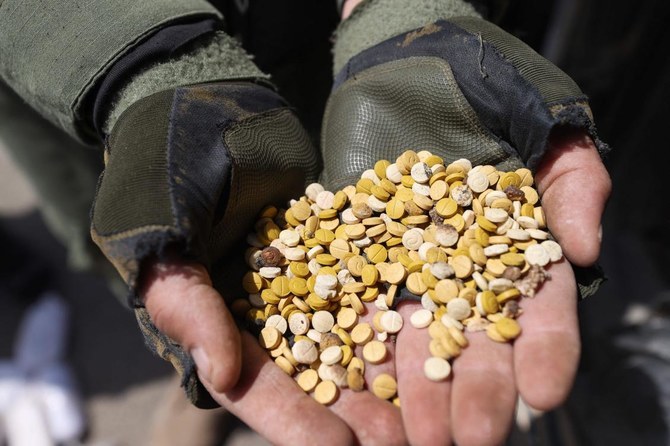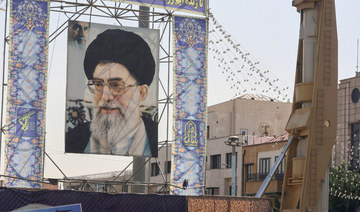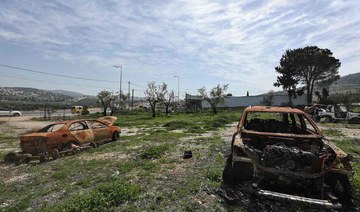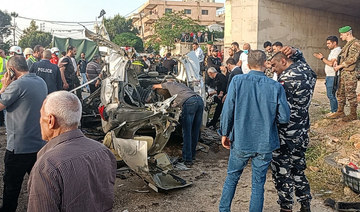WASHINGTON: The United States on Tuesday imposed sanctions on a money exchanger and a group of firms across six countries involved in commodity shipments and business transactions that benefit Iran’s military and the Houthi militant group in Yemen and the Hezbollah militia in Lebanon.
The Treasury Department’s Office of Foreign Assets Control sanctioned six firms, two tankers and a money exchanger, all either based or registered in Liberia, India, Vietnam, Lebanon or Kuwait. They are accused of materially benefiting Iran, the Houthis and Hezbollah.
Hezbollah and the Houthis have been launching regular attacks since the onset of Israel’s war against Hamas in Gaza, and they have sparked international concern that the war in the Palestinian enclave could spill over into the rest of the Middle East.
Hezbollah militants and Israeli troops exchange fire on a near-daily basis along Lebanon’s southern border, which has led to the displacement of tens of thousands of people on both sides. Despite losing more than 200 combatants and Israel striking deeper into the tiny country, Hezbollah maintains that it will stop launching rockets into northern Israel only when there is a ceasefire in Gaza.
Meanwhile, Yemen’s Houthls, who control much of Yemen’s north and west, have been launching drones and missiles on ships in the Red Sea, which they say is an effort to pressure Israel to end its war. Despite US-led airstrikes over the past two months, they have carried on with their campaign.
In a separate announcement Tuesday, Treasury slapped sanctions on 11 people and entities accused of facilitating financial transfers to the Syrian government to help it duck sanctions and being involved in the trafficking of a highly addictive amphetamine called Captagon that has become a booming industry in the war-torn country.
Treasury sanctioned a Syrian identified as Taher Al-Kayali and his company Neptunus LLC, accused of purchasing cargo ships to smuggle Captagon to Europe. One of his ships was intercepted by Greek authorities in 2018. Mahmoud Abulilah Al-Dj and his companies Al-Ta’ir Company and FreeBird Travel and Tourism were also sanctioned. He has had several of his drug shipments seized in Libya, and has cooperated with Abulilah. Al-Dj is also the “exclusive agent” of sanctioned Syrian airliner Cham Wings in Libya, Treasury said.
Experts say Captagon is primarily produced in Syria and Lebanon, where packages containing millions of pills are smuggled into Gulf countries, Europe and elsewhere. The trade allegedly has strong ties to Syrian President Bashar Assad and his associates, as well as the Iran-backed Hezbollah militant group in neighboring Lebanon.
Western governments estimate that the industry has generated billions of dollars in revenue for Syria. Syria’s Arab neighbors, notably Jordan, Saudi Arabia, and other Gulf states, have been desperate to halt the trade, as millions of pills have been smuggled in.
Meanwhile, Treasury slapped sanctions on Syria-based Maya Exchange Company, as well as Aleksey Makarov, the vice president of the listed Russian Financial Cooperation Bank, and Muhammad ‘Ali Al-Minala of the Syrian central bank, who used the exchange company to make payments to “a Jordanian beneficiary”.
Treasury also slapped sanctions on STF Logistic which it claims has generated tens of millions of revenue for the Syrian government and through a 50-year contract with Damascus has been granted the right to almost three-quarters of sales revenue from Syrian mines near Palmyra. Grains Middle East Trading, and its chief executive officer Yafi David were sanctioned for serving as an intermediary for STF Logistic. The company is based in Switzerland and the United Arab Emirates.
Assad’s crackdown on protests in 2011 led to his global isolation, and his forces were accused of torture, bombing civilian infrastructure, and using chemical weapons with support of key allies Russia and Iran.
US imposes more Iran sanctions and hits Syrian regime with penalties for drug trafficking
https://arab.news/g2w6p
US imposes more Iran sanctions and hits Syrian regime with penalties for drug trafficking

- The Treasury Department’s Office of Foreign Assets Control sanctioned six firms, two tankers and a money exchanger
- Treasury sanctioned a Syrian identified as Taher Al-Kayali and his company Neptunus LLC, accused of purchasing cargo ships to smuggle Captagon to Europe
35,562 Palestinians killed in Gaza offensive since Oct. 7 — health ministry

DUBAI: More than 35,562 Palestinians have been killed and 79,652 injured in the Israeli military offensive on Gaza since Oct. 7, the Gaza health ministry said in a statement on Monday.
One hundred and six Palestinians were killed and 176 injured in the past 24 hours, the ministry added.
Source close to Hezbollah says 4 dead in Israeli strikes on Lebanon

- The source close to Hezbollah told AFP that “at least four Hezbollah fighters were killed in Israeli raids on two different sites in southern Lebanon“
- The Israeli military said fighter jets struck “a Hezbollah terrorist cell”
BEIRUT: A source close to Hezbollah said four fighters were killed Monday in south Lebanon, with the Iran-backed group announcing two dead and a retaliatory attack, while Israel claimed strikes.
Hezbollah, a Hamas ally, has traded near daily cross-border fire with Israeli forces since the Palestinian group’s October 7 attack on southern Israel that sparked the war in Gaza.
The source close to Hezbollah told AFP that “at least four Hezbollah fighters were killed in Israeli raids on two different sites in southern Lebanon,” identifying the locations as Naqura on the coast and Mais Al-Jabal, a border village to the east.
The Shiite Muslim movement said two of its fighters, both from Naqura, had been killed, without providing further details.
The Israeli military said fighter jets struck “a Hezbollah terrorist cell” and a launch post in the Mais Al-Jabal area, while Israeli army “artillery fired to remove a threat” in the Naqura area.
Hezbollah said it launched a heavy rocket attack at an Israeli army barracks in the country’s north “in retaliation” for the Naqura strike, while also announcing other attacks on Israeli positions.
Lebanon’s official National News Agency (NNA) reported Israeli strikes on Mais Al-Jabal and Naqura, where it said Israel fired near Hezbollah-affiliated rescue personnel and wounded a civilian.
The fighting has killed at least 423 people in Lebanon, mostly militants but also including 82 civilians, according to an AFP tally.
Israel says 14 soldiers and 11 civilians have been killed on its side of the border.
The violence has raised fears of all-out conflict between Hezbollah and Israel, which went to war in 2006.
War monitor says Israeli strikes kill six pro-Iran fighters in Syria

- A Hezbollah source said that at least one fighter from the group was killed in Israeli strikes in the Qusayr area
Beirut: A war monitor said at least six pro-Iran fighters were killed Monday in Israeli strikes in Syria near the Lebanese border, in an area where Lebanon’s powerful Hezbollah group holds sway.
The Syrian Observatory for Human Rights said “Israeli strikes targeted two positions of pro-Iran groups in the Homs region,” including “a Hezbollah site in the Qusayr area” near the border where “six Iran-backed fighters were killed.”
The Observatory did not specify their nationalities.
A Hezbollah source told AFP that at least one fighter from the group was killed in Israeli strikes in the Qusayr area.
Israel rarely comments on individual strikes in Syria but has repeatedly said it will not allow its arch-enemy Iran to expand its presence there.
On Saturday, the Observatory said an Israeli drone strike near the Lebanese border targeted a vehicle carrying “a Hezbollah commander and his companion,” without reporting casualties.
Hezbollah did not announce any deaths among its ranks on Saturday.
On May 9, Israeli strikes on Syria targeted facilities belonging to Iraq’s Al-Nujaba armed movement, the Observatory and the pro-Iran group said, with Damascus saying an unidentified building was attacked.
The Israeli military has carried out hundreds of strikes in Syria since the outbreak of the civil war in its northern neighbor in 2011, mainly targeting army positions and Iran-backed fighters including from Lebanon’s Hezbollah group.
But the strikes increased after Israel’s war with Hamas in the Gaza Strip began on October 7, when the Iran-backed Palestinian militant group launched an unprecedented attack against Israel.
Syria’s war has killed more than half a million people and displaced millions more since it erupted in 2011 after Damascus cracked down on anti-government protests.
ICC prosecutor seeks arrest warrant for Israeli and Hamas leaders, including Netanyahu

- Karim Khan believes Benjamin Netanyahu, Yoav Gallant and three Hamas leaders are responsible for war crimes and crimes against humanity
THE HAGUE, Netherlands: The chief prosecutor of the International Criminal Court said Monday he is seeking arrest warrants for Israeli and Hamas leaders, including Israeli Prime Minister Benjamin Netanyahu, in connection with their actions during the seven-month war between Israel and Hamas.
Karim Khan said that he believes Netanyahu, his defense minister Yoav Gallant and three Hamas leaders — Yehia Sinwar, Mohammed Deif and Ismail Haniyeh — are responsible for war crimes and crimes against humanity in the Gaza Strip and Israel.
The prosecutor must request the warrants from a pre-trial panel of three judges, who take on average two months to consider the evidence and determine if the proceedings can move forward.
Israel is not a member of the court, and even if the arrest warrants are issued, Netanyahu and Gallant do not face any immediate risk of prosecution. But Khan’s announcement deepens Israel’s isolation as it presses ahead with its war, and the threat of arrest could make it difficult for the Israeli leaders to travel abroad.
Both Sinwar and Deif are believed to be hiding in Gaza as Israel tries to hunt them down. But Haniyeh, the supreme leader of the Islamic militant group, is based in Qatar and frequently travels across the region.
There was no immediate comment from either side.
Israel launched its war in response to an Oct. 7 cross-border attack by Hamas that killed some 1,200 people, mostly civilians, and took 250 others hostage. The Israeli offensive has killed over 35,000 Palestinians, at least half of them women and children, according to the latest estimates by Gaza health officials. The Israeli offensive has also triggered a humanitarian crisis in Gaza, displacing roughly 80 percent of the population and leaving hundreds of thousands of people on the brink of starvation, according to UN officials.
Speaking of the Israeli actions, Khan said in a statement that “the effects of the use of starvation as a method of warfare, together with other attacks and collective punishment against the civilian population of Gaza are acute, visible and widely known. ... They include malnutrition, dehydration, profound suffering and an increasing number of deaths among the Palestinian population, including babies, other children, and women.”
The United Nations and other aid agencies have repeatedly accused Israel of hindering aid deliveries throughout the war. Israel denies this, saying there are no restrictions on aid entering Gaza and accusing the United Nations of failing to distribute aid. The UN says aid workers have repeatedly come under Israeli fire, and also says ongoing fighting and a security vacuum have impeded deliveries.
Of the Hamas actions on Oct. 7, Khan, who visited the region in December, said that he saw for himself “the devastating scenes of these attacks and the profound impact of the unconscionable crimes charged in the applications filed today. Speaking with survivors, I heard how the love within a family, the deepest bonds between a parent and a child, were contorted to inflict unfathomable pain through calculated cruelty and extreme callousness. These acts demand accountability.”
After a brief period of international support for its war, Israel has faced increasing criticism as the war has dragged on and the death toll has climbed.
Israel is also facing a South African case in the International Court of Justice accusing Israel of genocide. Israel denies those charges.
Israel intends to broaden Rafah sweep, Defense Minister Gallant tells Washington

- After weeks of public disagreements with Washington over the Rafah planning, Israel on May 6 ordered Palestinian civilians to evacuate parts of the city and began troop and tank incursions.
JERUSALEM: Israel intends to broaden its military operation in Rafah, Defense Minister Yoav Gallant on Monday told a senior aide to US President Joe Biden, who has warned against major action in the southern Gazan city that may risk mass civilian casualties.
Israel describes Rafah, which abuts the Gaza Strip’s border with the Egyptian Sinai, as the last stronghold of Hamas Islamists whose governing and combat capabilities it has been trying to dismantle during the more than seven-month-old war.
After weeks of public disagreements with Washington over the Rafah planning, Israel on May 6 ordered Palestinian civilians to evacuate parts of the city and began troop and tank incursions.
“We are committed to broadening the ground operation in Rafah to the end of dismantling Hamas and recovering the hostages,” a statement from Gallant’s office quoted him as telling visiting US National Security Adviser Jake Sullivan.
Israel believes dozens of hostages from the cross-border Hamas rampage on Oct. 7 are being held in Rafah.
Western powers and Egypt have voiced concern for the fate of hundreds of thousands of displaced Palestinians sheltering there, despite Israeli assurances about humanitarian safeguards.
The UN agency for Palestinian refugees UNRWA said on Monday that it estimated 810,000 people had fled Rafah since May 6 — potentially more than half of the city’s wartime population.
There was no immediate US comment on the Gallant talks.
The statement from Gallant’s office said he “presented to (National Security) Adviser Sullivan the provisions Israel implemented for evacuating the population from the Rafah area and for setting up the appropriate humanitarian response.”
Israel says its forces in Rafah have discovered dozens of tunnels from the Sinai, a potential embarrassment for Cairo. The Egyptian state information service has previously dismissed speculation about cross-border smuggling to Gaza as “lies.”




















